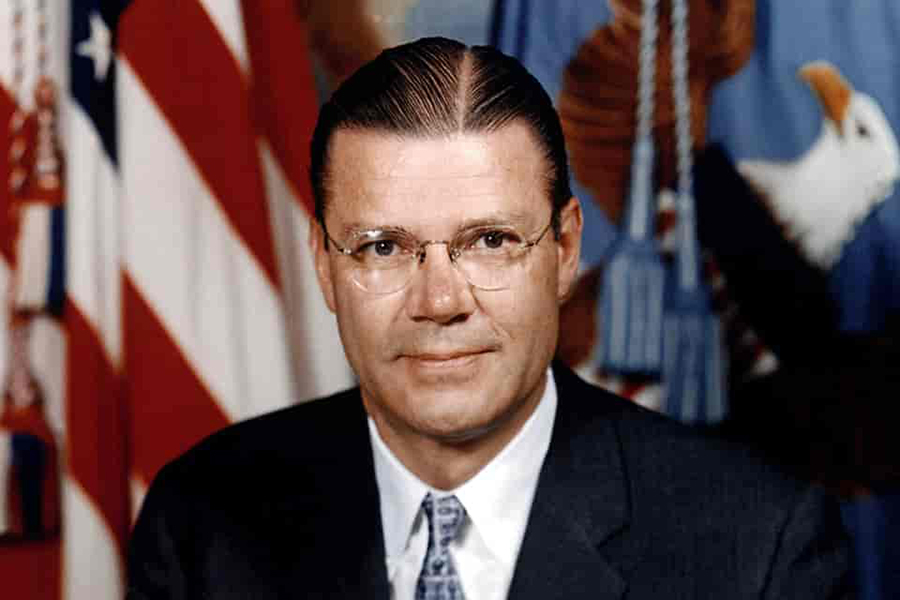On July 6, 2009, Robert McNamara died. On behalf of the Global Security Institute, I offer our deepest condolences to his friends and family. We pray that he rests in eternal peace, forgiveness, and love.
Long before the creation of the Global Security Institute, Senator Cranston and I had been working for years with this extraordinary man whose career engaged him as President of the Ford Motor Company and later the World Bank and US Secretary of Defense. His commitment to eliminate nuclear weapons was informed by knowing all too well several important truths: humans are fallible, civilization was saved by “good luck” in the Cuban Missile crisis, nuclear weapons — if they continue to exist — will eventually be used by accident or foolish design, and nuclear weapons are devastating in their destructive capacity beyond human imagination
I am grateful to have had the privilege of working with and becoming his friend. Perhaps the most profound lesson I learned from him was that a person can continue to learn and grow at any age. One evening around midnight I received a call from him. He inquired whether it was OK to use a footnote (number 35) from a law review article I had written in his analysis of the need for moral compass points in international policies, a major theme he emphasized in his book Wilson’s Ghost and a critical point he had learned in the crucible of experience.
As we discussed the universality of the Golden Rule I realized that he was investigating this profound moral pillar with the intensity and openness of a youthful student. Moreover, he evaluated his own conduct and that of our nation in relation to it. He wrote that book to address two questions: “Why, in essence, did 160 million people die in violent conflict in the 20th century? What must be done to prevent the 21st century from becoming as lethal – or worse- than the 20th?” I strongly recommend this book to anyone serious about world peace and security.

His forceful opposition to nuclear weapons, perhaps most eloquently stated in his 2005 Foreign Policy article, constituted one of the most effective voices for nuclear abolition. Long before the groundbreaking Wall Street Journal op/eds by Schultz, Nunn, Kissinger and Perry, Robert McNamara demonstrated that even the most visible cold warrior can understand that nuclear weapons in the 21st century pose more of a problem than any problem they seek to solve, and that to favor nuclear abolition is to be neither naive or anti-American.Beyond our shared work on nuclear disarmament, Mr. McNamara and I collaborated on other issues as well. Our work together to promote the International Criminal Court, for example, in part resulted in his influential New York Times op/ed co-authored with Benjamin Ferencz.
While he was Secretary of Defense, to me he represented the failed policies that led to so much unnecessary suffering in the war in Vietnam. As a youth I carried so much venom for him. As I came to know what a good and caring man he was, I realized how foolish and arrogant I had been to judge his person thusly and how much good he actually had done in his life. One could make a good argument that during the Cuban Missile Crisis he was instrumental in saving civilization. But more importantly I came to realize that a person with sincerity can learn and grow. I also learned from working with him while he was in his eighties how fully committed he was to making the world a safer place and how willing he was to extend his time, his energy, his very health in this endeavor.
In the Epilogue of Wilson’s Ghost, he expressed his affection for an Archibald MacLeish poem “The Young Dead Soldiers”: They say: Our deaths are not ours; they are yours; they will mean what you make them. They say: Whether our lives and our deaths were for peace and a new hope or for nothing we cannot say; it is you who must say this. They say: We leave you our deaths. Give them their meaning…One should not be sad about a person passing at 93 but we will surely miss him. He helped amplify GSI’s advocacy for nuclear disarmament countless times. We remain grateful to have walked with him. May God bless his soul with infinite peace.

Jonathan Granoff,
President, Global Security Institute
Video Resources
“From the Crucible of Experience,” UN Panel Event featuring Robert McNamara, Ted Sorensen and Ambassador Thomas Graham, Jr., chaired by GSI President Jonathan Granoff, May 24, 2005.
American Bar Association Showcase Presentation: A Dialogue with Ted Sorensen, Robert McNamara and Jonathan Granoff, Spring 2004.
Audio Resources
“Nuclear Disarmament: An Impossible Dream?” Radio Transcript, Justice Talking, featuring Robert McNamara, Richard Rhodes, Jonathan Granoff and Nikolas Gvosdev, Air Date: 10/9/2006.
Articles and Transcripts
“Apocalypse Soon,” by Robert McNamara, Foreign Policy,May/June 2005.
Young Presidents’ Organization Hosts GSI Panel on Global (In)security, featuring Robert McNamara, Kim Campbell, Suzanne Spaulding, Jonathan Granoff and Robert Grey, Jr., San Francisco, January 9, 2003.
“Robert S. McNamara Calls for Nuclear Disarmament at United Nations,” GSI Event Report, October 17, 2001.
GSI Hosts Thirteen Days on Capitol Hill, film screening and discussion with Robert McNamara
“For Clinton’s Last Act,” op/ed by Robert McNamara and Benjamin Ferencz, New York Times, December 12, 2000.
“Bush and Gore at the Nuclear Crossroads: The next presidency, nuclear security and national survival,” panel co-organized by GSI and Fourth Freedom Forum, featuring Jonathan Alter, Newsweek Magazine; Bill Joy, Co-Founder and Chief Scientist, Sun Microsystems; Robert McNamara, former Secretary of Defense; Jonathan Schell, Harper’s Magazine; Admiral Stansfield Turner, former Director, Central Intelligence Agency and former Senator Alan Cranston. Boston, October 3, 2000.*Footnote 37 in Granoff, J.,
“Nuclear Weapons, Ethics, Morals, and Law,” Brigham Young Law Review, 2000 (4), 1421-22.
Buddhism: “Hurt not others in ways that you yourself would find hurtful.” Udana-Varga, 5:18. Christianity: “All things whatsoever you would that men should do to you, do you even so to them.” In Matthew 7:12; Confucianism: “Do not unto others what you would not have them do unto you.” Analects 15:23.
Hinduism: “This is the sum of duty: do not unto others that which would cause you pain if done to you.” Mahabharata 5:1517.
Islam: “No one of you is a believer until he desires for his brother that which he desires for himself.” Hadith;
Jainism: “In happiness and suffering, in joy and grief, we should regard all creatures as we regard our own self.” Lord Mahavir 24th Tirthankara.
Judaism: “What is hateful to you, do not do to your fellow man. That is the law; all the rest is commentary.” Talmud, Shabbat 31a.
Zoroastrianism: “That nature only is good when it shall not do unto another whatsoever is not good for its own self.” Dadistan-I-Dinik, 94:5.
The Global Security Institute is dedicated to strengthening international peace and security based on co-operation, diplomacy, shared interests, the rule of law and universal values. Our efforts are guided by the skills and commitment of our team of former heads of state, distinguished diplomats and politicians, celebrities, religious leaders, Nobel Peace Laureates, disarmament and legal experts, and concerned informed citizens. Our focus is on controlling and eliminating humanity’s greatest threat – nuclear weapons.







